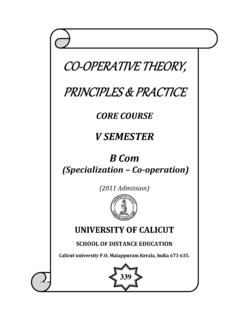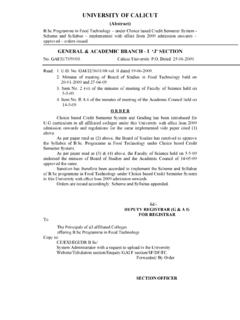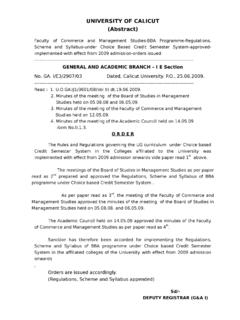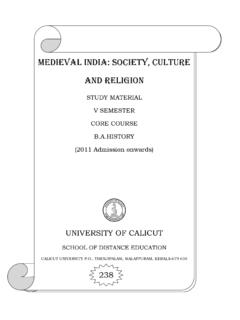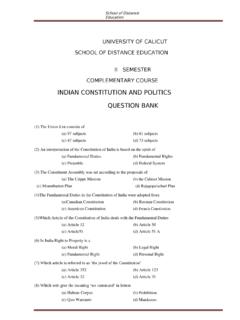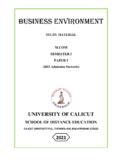Transcription of COMPARATIVE POLITICAL SYSTEMS
1 School of Distance EducationComparative POLITICAL SystemPage1 STUDY MATERIALCOMPARATIVE POLITICAL SYSTEMSForMA POLITICAL SCIENCEPAPER-VII YEAR(2013 ADMISSION ONWARDS)UNIVERSITY OF CALICUTSCHOOL OF DISTANCE EDUCATIONC alicut University, Malappuram,Kerala, India-673 635495 ASchool of Distance EducationComparative POLITICAL SystemPage2 UNIVERSITY OF CALICUTSCHOOL OF DISTANCE EDUCATIONSTUDY SCIENCEPAPER VComparative POLITICAL SystemsII YEARP repared Professor and Department of POLITICAL scienceSree Kerala Varma College, Salin C Department of POLITICAL scienceSree KeralaVarma College, Professor and Department of POLITICAL scienceSree Kerala Varma college, V: COMPARATIVE POLITICAL SYSTEMS (The course will he discussed with reference to , , France, Russia, China and India)Layout & Settings:Computer Section, SDES chool of Distance EducationComparative POLITICAL SystemPage3 ReservedCONTENTSPAGESMODULE-I05-20 MODUL-II21-35 MODULE-III36-52 MODULE-IV53-66 MODULE-V67-81 MODULE-VI82-98 MODULE-VII99-114 School of Distance EducationComparative POLITICAL SystemPage4 Module-INature, Evolution and Scope of COMPARATIVE System-Meaning and Nature, POLITICAL modernization , POLITICAL of COMPARATIVE Politics:System theories , Cultural theories , Class theories , Development and Survey on Rule Making, Rule Application and Rule Adjudication Aggregation and Party SYSTEMS - COMPARATIVE VIInterest Articulation and Interest Groups.
2 A COMPARATIVE Analysis of Pressure VIIB ureaucracy (INDIA, USA, UK, CHINA AND FRANCE)-A COMPARATIVE AnalysisSchool of Distance EducationComparative POLITICAL SystemPage5 Module-IMeaning, Nature and Scope of COMPARATIVE politics Comparison is man s instinctive tendency which impels him to appraise his own conductvis-a-visthose of others. He is ever keen to know how people around him live, behave and act. The study ofComparative Politics is at the heart of contemporary POLITICAL Science. COMPARATIVE Politics has,therefore become a field of growing importance in all the countries. More recently, modern SocialScience has increased our power to observe and comparesystematically empirical world of factsaround us and to subject many of these facts and processes to qualitive measurement and logical andmathematical analysis. At the same time, the behavioural Sciences have given us a good deal of newand partly verified information as to how people think, feel, perceive and act individually and in agroup.
3 Before we attempt to define COMPARATIVE Politics we should first define the term COMPARATIVE and then Politics. By Comparison, one can see patterns of activity,taken by different regimes, analyse differingideologies and processes and decision making and examine propositions about both importance ofcertain characteristics under study and the relationship between classes of data. Comparison allowssystematic empirical testing of generalization used to order diverse data. By comparison one mayobserve patterns, similarities and story of the world Politics began the Polis the City state community of ancient , Aristotle and manyof their contemporaries regarded Politics as the affairs of the Polis. Politicsis, therefore, only one of the several social activities of man. The essence of it said to lie infundamental freedom of man in society to master his own fate by POLITICAL means.
4 Politics is, thus, the process through which man orders the society in which he lives according to his POLITICAL ideasabout the ends of man. The study of politics is concerned with the description and analysis of the manner in which power isobtained, exercised and controlled, the purpose of which it is used, the manner in which decision aremade and the context in which those decisions take place. Politics also means striving to share poweror striving to influence the distribution of power, eitheramong states or among groups within a may conclude by saying that politics deals with power, rule or of COMPARATIVE PoliticsComparative Politics is concerned with behaviour, institutions, processes, ideas and values presentinmore than one country. It searches for those regularities and patterns, those similarities anddifferences between more than one nation state that help clarify the basic nature, working and beliefof regimes. COMPARATIVE Politics studies a broader rangeof POLITICAL activity, including governmentsand their institution as well as other forms of organization not directly related to national government;for example ,tribes, communities, associations, Unions etc.
5 COMPARATIVE Politics, like PoliticalSchool of Distance EducationComparative POLITICAL SystemPage6science, relates both to Theory and Methods. Theory refers to sets of systematically relatedgeneralizations and Method is a procedure or process that involves the techniques and tools utilized ininquiring and for examining, teaching, testing and evaluating theory . COMPARATIVE Politics is alsoconcerned with the norms, basic beliefs and values underlying POLITICAL activity. The field ofComparative Politics involves the systematic and COMPARATIVE study of nations and their practice the COMPARATIVE politics do the first, to compare means that similarities and differences aredescribed. COMPARATIVE politics describes the real world and, building on these descriptions,establishes classifications and typologies. For example, we classify different types of electoralsystems. Similarities and differences are explained.
6 Why did social revolutions take place in Franceand Russia but not in Germany and Japan? Why is there no socialist party in the US whereas theyexist in all other Western democracies? Why is electoral turnout in the US and Switzerland so muchlower than in any other democracy? As in all scientific disciplines, we formulate hypotheses trying toexplain these differences (to control variation) and use empirical data to test them to check whether ornot hypothesis hold true in reality. It is through this method that causality can be inferred,generalizations produced, and theories developed and improved. For example, is it empirically truethat proportional representation (PR) tend to produce more fragmented party of COMPARATIVE PoliticsThe study of COMPARATIVE politics became highly significant in the 1950s when a good number ofleading American POLITICAL scientists sought to transform the field of politics by takingthe study ofthis subject from foreign to COMPARATIVE POLITICAL phenomenon and from the study of thegovernments to the study of the POLITICAL SYSTEMS .
7 However, the historical development of thissubject may be roughly put into three phases unsophisticated, sophisticated, and contributions made to the study of politics by great figures like Aristotle, Machiavelli, deTocqueville, Bryce, Ostrogorski and Weber belong to the first phase who simply utilized thecomparative method for the primary purpose of better understanding the working of the politicalorganizations. These writers employed, what was called, the COMPARATIVE method that aimed throughthe study of existing politics or those which had existed in the past to assemble a definite body ofmaterial from which the investigator by selection, comparison, and elimination may discover the idealtypes and progressive forces of POLITICAL history .The contributions of some important recent writers like Samuel , M. Hass, Bernard Ulam andRoy C. Macridis may be included in the second phase who made use of the COMPARATIVE method witha good amount of self consciousness and also with a deliberate mood to present a more useful studyof different POLITICAL institutions.
8 Theyare concerned with the various strategies of comparison areastudies, conngurative approach, institutional and functional comparisons, a problem-based orientationSchool of Distance EducationComparative POLITICAL SystemPage7and with various methodological problems conceptualization, the establishment of agreed categoriesfor comparison, validity as a problem, cross-cultural difficulties and the availability of contributions of David Easton, Gabriel A. Almond, James C. Coleman, Karl Deutsch, , Harold Lasswell, Robert A. Dahl, Edward Shils, Harry Eckstein, David Apter, Lucian , Sidney, Verba Myron Weiner and a host of others may be included in the final phase. Thewriters belonging to this phase have made use of inter-related set of concepts for the sake ofpresenting their contribution on thebasis of COMPARATIVE analysis, though they have provided aspecialized vocabulary in the their own says.
9 As Roberts says: If Easton talks of inputs, outputs,demands, gatekeepers, supports and stresses, environment, feedback, values, critical ranges andpolitical authorities; Almond offers a set of input and output functions; Deutsch borrows a cyberneticlanguage which applies to POLITICAL SYSTEMS the concept of feedback of various types-autonomy,memory, load, lag, lead and gain, receptors, communication, selective screening of information andso on. Almond s aim of universality sums up the purpose for the choice of such languages theyare sufficiently general to be applicable to any POLITICAL unit, regardless of size, period, degree ofdevelopment or other factors .NATURE AND SCOPE OF COMPARATIVE POLITICSIn the field of COMPARATIVE politics, the term politics the term has three connotations politicalactivity, POLITICAL process and POLITICAL power POLITICAL activity consists of the efforts by whichconditions of conflicts are created and resolved in a way pertaining to the interests of the people as faras possible, who play their part in the struggle for power.
10 The reduction of tensions or the resolutionof conflicts naturally takes place through the operation of permanent mechanisms of tension reductionas well as, from time to time, by the introduction of further reserve mechanisms designed to reducethe amount of tensions and conflicts in emergencies. If politics means the authoritative allocation of values , some measure of conflict is bound to arise between values as desired by the people and values as held by the men in power. Thus arise conflicts that demand their solution and what leadsto efforts in this regard constitutes POLITICAL activity. It is the government that has to solve theseconflicts by whatever means are at its disposal, the only limitation being that in so doing it mustprevent the break-up of the not only connotes POLITICAL activity . It also implies a train activity, , efforts directedtowards creating the conditions of tension and having their resolution until the point of spontaneous unanimity is achieved.
